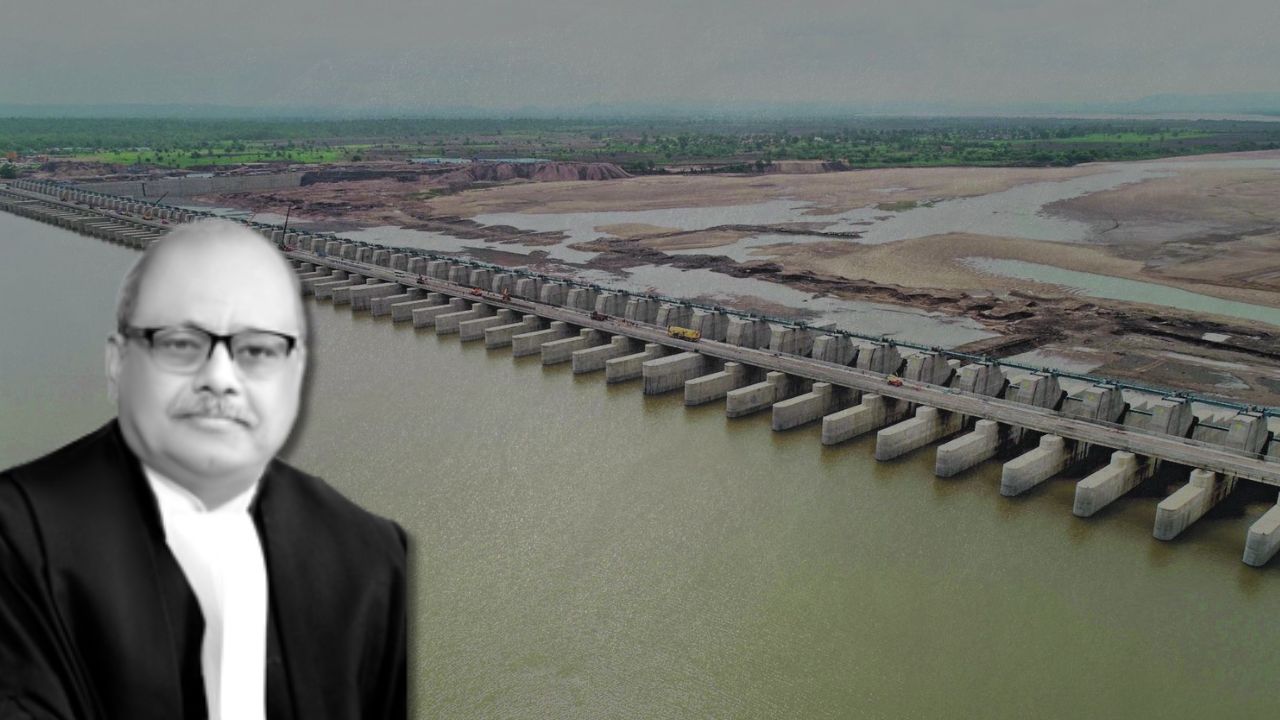The KLIP was a flagship project initiated by the previous Bharat Rashtra Samiti (BRS) government and was designed to lift water from the Godavari River to irrigate drought-prone farmland. However, its credibility has come under scrutiny following the structural failure at Medigadda and allegations of financial irregularities and engineering lapses.
Published Jul 31, 2025 | 4:32 PM ⚊ Updated Jul 31, 2025 | 4:32 PM

The Congress has repeatedly accused the previous BRS administration of compromising quality in return for alleged kickbacks.
Synopsis: Justice PC Ghose on Thursday submitted the final report of the one-man judicial commission probing the Kaleshwaram Lift Irrigation Project to the Telangana government, concluding a 15-month inquiry into alleged irregularities. The report is expected to detail technical, financial and administrative lapses in the construction of the Medigadda, Annaram and Sundilla barrages, following the collapse of a section of Medigadda in October 2023. The government is likely to review the findings in an upcoming Cabinet meeting before placing the report in the Legislative Assembly for further debate.
The Justice Pinaki Chandra Ghose Commission, appointed to probe alleged irregularities in the execution of the Kaleshwaram Lift Irrigation Project (KLIP), has submitted its report to the Telangana government, bringing to a close a 15-month-long inquiry into what was once touted as the state’s most ambitious infrastructure project.
The report is expected to highlight critical lapses – technical, financial and administrative – in the implementation of the KLIP, particularly in connection with the structural failures observed at the Medigadda, Annaram and Sundilla barrages.
Justice Ghose personally handed over the sealed report to Irrigation Principal Secretary Rahul Bojja on Thursday, 31 July, at BRK Bhavan in Hyderabad. Bojja is expected to forward the report to the Chief Secretary, who will then place it before the Chief Minister.
The inquiry was initiated after a portion of the Medigadda barrage collapsed on 21 October 2023, just weeks before the Assembly elections.
The incident, along with mounting allegations of widespread corruption and poor construction quality, prompted the Congress-led government under Chief Minister A Revanth Reddy to appoint a one-man judicial commission in March 2024, headed by former Supreme Court judge PC Ghose.
On 23 June 2025, the Telangana Cabinet resolved to extend full cooperation to the commission, including access to past Cabinet decisions and supporting documents.
The KLIP was a flagship project initiated by the previous Bharat Rashtra Samiti (BRS) government and was designed to lift water from the Godavari River to irrigate drought-prone farmland. But, the project’s credibility has taken a beating since the structural failure at Medigadda and allegations of financial irregularities and engineering lapses.
The PC Ghose Commission report is expected to be discussed in detail at an upcoming Cabinet meeting and may later be tabled in the Legislative Assembly for wider debate.
Based on the findings, the Congress government is likely to decide its next course of action, which could include legal proceedings against individuals or firms held responsible for the Medigadda barrage collapse.
The Congress has repeatedly accused the previous BRS administration of compromising quality in return for alleged kickbacks. The government could pursue prosecution against those named in the report.
Depending on the Cabinet’s review, the report may also prompt further investigation by central or state agencies, including the Enforcement Directorate and the Anti-Corruption Bureau.
The political stakes remain high. While the ruling Congress has signalled its intent to act, the opposition BRS, led by former Chief Minister K Chandrashekar Rao, continues to defend KLIP as a transformative project aimed at securing irrigation and drinking water for large parts of Telangana.
With the report now in government hands, a fresh round of political confrontation appears inevitable between the ruling Congress and the opposition BRS.
While the Congress may cite the findings to initiate legal or administrative action, the BRS is expected to defend its decisions and challenge any punitive steps as politically driven.
The Ghose Commission’s inquiry covered a wide spectrum: project planning, design, construction, quality control and ongoing maintenance.
During the investigation, the commission examined approximately 115 witnesses, including prominent political figures such as KCR, former Irrigation Minister T Harish Rao, and former Finance Minister Eatala Rajender, now a BJP MP.
Several serving and retired engineers, officials from the irrigation and finance departments, and representatives from major contractors – L&T, Navayuga and Afcons – were also questioned.
The inquiry scrutinised decision-making protocols, project clearances and engineering choices – most notably the use of secant piles, which are now seen as a possible cause of the Medigadda structural failure.
Another area of focus was the relocation of the original project site from Thummidihatti in Adilabad to Medigadda in Bhupalpally district. During his deposition, KCR is understood to have defended the decision, citing expert advice from the Central Water Commission and the consultancy firm WAPCOS regarding inadequate water availability at Thummidihatti.
Supporting documents were reportedly submitted by Harish Rao, including Cabinet and Assembly records, to justify the site change.
Though initially given a three-month mandate, the commission’s term was extended six times – June, August, November and December 2024, and again in February and May 2025.
These extensions enabled a detailed examination of affidavits, engineering reports, financial data and inputs from key bodies, including the National Dam Safety Authority (NDSA).
The NDSA, in its assessment, flagged serious concerns such as the sinking of piers and erosion of the downstream apron – issues that have reinforced broader doubts about the structural integrity of the project.
(Edited by Dese Gowda)
